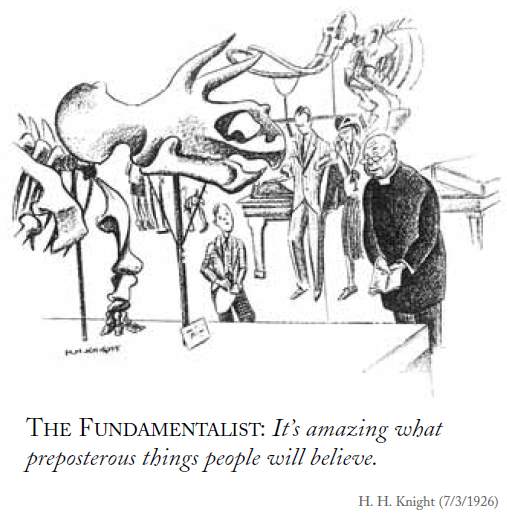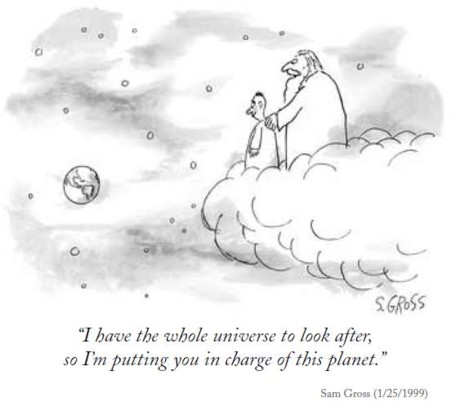Back in April 2013 I had another visit from our neighbourhood Jehovah's Witnesses, a pretty young woman and her husband, recently married. Like Daniel (mentioned elsewhere on this website) before them, they had brought copies of The Watchtower and Awake; which I agreed to read if they were prepared to read my paper: The Prospect of Eternal Life.
I keep a couple of copies of The Prospect of Eternal Life for just such occasions and have also given a copy to the local Anglican minister and to various other active proselytisers in the area; with similar conditions. Of course I know it will not change their position but I do like to have the debate and amazingly so do they; it beats the usual reception they get; and they get some practice in trying to convert un-believers.
When the couple asked my position I quickly summarised that in The Prospect of Eternal Life:
|
For most of the past century we have known that our galaxy, the Milky Way, contains about three hundred billion stars, like our Sun. Astronomers estimate that there are as many galaxies. Thus the observable universe is now estimated to contain 9 × 1021 stars (9 billion trillion stars). Planets have been discovered orbiting most nearby stars and it is believed that most stars have a planetary system, just as most planets have moons. It is extremely likely that a number of the billions of trillions of planets, that we now assume to exist, host complex life. None of them are likely to resemble humans but if they’re intelligent do they too embody an immortal soul? If they don’t, why not? We now estimate the universe to be 13.7 billion years old but believe this nevertheless to be quite young, at the beginning of its life. The earth has been around for less than a third of this time. The fossil record shows that there has been life in some form on the earth for over half of its life but complex animals, consisting of a large number of cells cooperating and specializing to create a single being, are relatively recent. The large dinosaurs were very recent in universal time and lived from around 260 to 65 million years ago, after which mammals began to predominate. In the whole period since the dinosaurs disappeared our star, the sun, has completed less than one orbit of our galaxy (less than one galactic year has passed). Astronomers agree that while the universe is still in its infancy, in around 6 galactic years, the Earth will become uninhabitable, losing its atmosphere as the sun becomes larger and hotter. Humans in our present form have been around for less than a galactic day and will be gone long before the Earth perishes; perhaps in another galactic day or so. But the universe will go on for many more galactic years afterward. According to Christians less than ten Galactic minutes ago God decided to send his only son to save humanity from damnation - unfortunately late it seems, for all those who lived during the preceding 70,000, or so, terrestrial years. His most recent Prophet, according to Islam, arrived even later. Just as, individually, our lives are short; we can be sure that the existence of the human species is but a fleeting and insignificant moment in the life and scope of the universe. 'Like a camera flash in a darkened stadium during a yearlong event'. It seems to me that the creator of this universe would have about as much interest in the welfare of humanity as you do in the welfare of the bacteria living under your toenails. That an immortal soul is granted to each human foetus at conception, exclusively among animals and other cellular colonies (like a cabbage) and, potentially, extra-terrestrial life, is an even more bizarre and obviously concocted, anthropocentric idea.
|
The young Jehovah's Witnesses quickly decided that I was some sort of 'scientist' and gave me an Awake with an interview with a 'scientist' who was once and unbelieving rationalist but is now convinced "that Life was designed by God" and a brochure: The Origin of Life.
True to my word I have now read both. Needless to say I have not changed my position. But while I could easily understand where Brett Schenck - retired environmental consultant - was coming from and summarily dismiss his well-worn argument, I found The Origin of Life brochure fascinating.
Stripped of its religious elements The Origin of Life* brochure would be an excellent school primer on the modern scientific understanding of cellular reproduction. It discusses our understanding of DNA and RNA; the structure of chromosomes; prokaryotic cell structure; transcription and replication and how proteins are assembled and the enzymes involved. It's a good read and I would happily give it to, and discuss it with, a high school aged child.
Yet it's rated PG - parental guidance required. In discussion with a child I would draw to their attention that modern scientific knowledge, which in many respects Jehovah's Witnesses' deny is being used very selectively to support the contention that there is no inconsistency between a modern scientific view and the Biblical world view. This is, after all, one of several sects and traditional religions that deny the 'scientifically determined' age of the Universe.
The Biblical view, inherited from itinerant herders and bronze age Egyptians some three and a half thousand years ago and incorporated into Judaism, before being absorbed uncritically into Christianity and Islam is now vastly at odds with modern understandings in too many ways to list here, chapter by chapter, starting with Genesis - with the creation myth and the flood - all the way to the virgin birth and the miracles of the New Testament.
A constant theme in The Origin of Life brochure is that complexity cannot exist without an active architect; yet the very scientific discoveries they are using in evidence are predicated on the assumption that such complexity results from universal preconditions and the resulting physical characteristics of our universe. Science posits that such complexity is either inevitable, or randomly, one of an infinity of possible outcomes of these preconditions. It is these characteristics and preconditions that science seeks to discover as consistent principles or 'laws'.
Science embraces these 'physical laws' but denies an active 'guiding hand' or metaphysical intervention that wilfully subverts them. There are no caveats on the laws that govern the universe that say: "they apply except when God has a whim to suspend them", for example in response to human supplications.
If you want to call the formative principal or the fundamental characteristics of reality 'God' or the 'work of God' - go for it. Call it what you like. But this is a vastly different God to the one to whom you might pray for some personal reason like intercession or you might believe would be pleased to be praised. I can't imagine anyone praying: "almighty gravity please do not forsake this universe" or "mighty gravity you are so wonderful". Insert the Planck Constant or the speed of light, in place of gravity, to taste.
Science constantly evolves. There are even contradictions between a modern scientific view and the one that was taught to me in high school. For example tectonic plate expansion and plate subduction was a regarded as a fringe theory as was the 'big bang'; likely to be awarded an F (for effort). Similarly most advances in quantum mechanics, astronomy and biology have been within my adult lifetime.
That in turn was a vast advance on the reality understood by Rutherford; a huge advance on Newton and so back to the ancient Greeks; themselves a vast jump forward from the ancient Egyptians. These advances in our world view can be demonstrated to be valid as they allow us to do new things that we could not do when I was a boy: like transmitting data through an optical fibre using coherent light or moving genes from one organism to another. A typical mobile phone incorporates devices based on scientific knowledge not available when I was a boy. We didn't even have integrated circuits (silicon chips); LEDs (light emitting diodes) or LCDs (liquid crystal displays); let alone personal computers.
Needless to say, while the ancients held some views concerning reality that continue to be supported, the modern scientifically based world view contradicts the Biblical view in many, many ways. For example, the ancients believed that a man planted a seed in a fertile woman where it grew like a seed in soil. The woman was simply the vessel; not the origin of the ova, fertilised by the father. This simple misunderstanding underwrites many ancient mores around property; inheritance; and the position of women in society; that are just beginning to be revised today.
Our modern understanding of reproduction, discussed with some accuracy, in The Origin of Life brochure, is very recent; refined as recently as the Human Genome Project in 2000-2003.
Most extraordinary is the tacit acceptance of the modern understanding that life flows directly from a pair of living cells from the parents and a successful conception requires that both cells are already alive. Thus life is not created anew at conception, as the Bible would have us believe. There is no need for a foetus to quicken:- to receive the gift of life from God. Life is already present. What then of the ancient priestly concept of a soul?
This attempt to develop a literal concordance between the Bible (itself sufficiently self-contradictory to keep scholars arguing for three thousand years) and modern knowledge provides a wonderful example of doublethink.
|
Winston sank his arms to his sides and slowly refilled his lungs with air. His mind slid away into the labyrinthine world of doublethink. To know and not to know, to be conscious of complete truthfulness while telling carefully constructed lies, to hold simultaneously two opinions which cancelled out, knowing them to be contradictory and believing in both of them, to use logic against logic, to repudiate morality while laying claim to it, ... That was the ultimate subtlety: consciously to induce unconsciousness, and then, once again, to become unconscious of the act of hypnosis you had just performed. Even to understand the word 'doublethink' involved the use of doublethink. George Orwell (pseudonym of Eric Blair) (1903-1950) |
Where the authors do perceive a contradiction, particularly in the role of evolution as a 'designer' and in the age of the Universe, they opt for the Biblical version and the brochure ends with another wonderful example in which the authority of the Bible is proven by no greater authority than: The Bible.

Cartoons from The New Yorker (the complete cartoons of © 2004)
Footnote:
*I recently attempted to revisit this brochure on the Jehovah’s Witnesses website, to provide readers with a link, only to find that it has been replaced with a longer version: The Origin of Life—Five Questions Worth Asking, further annotated with Biblical quotes and convolutions. I wouldn't expect anyone to struggle through all that nonsense (download it at your peril...). Yet the basic difficult to reconcile biological reality remains - so far we've found only one life on Earth and all living organisms past and present inherited it. Thus LUCA, the last universal common ancestor, is defined as the most recent common ancestor of all current life on Earth.
